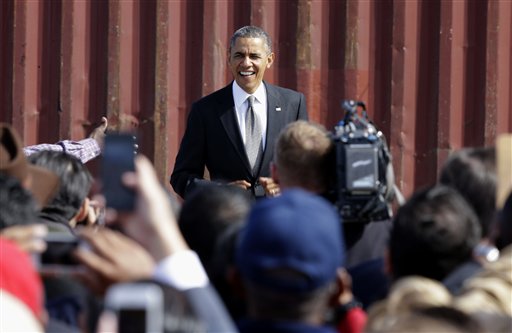When even the New York Times is comparing President Obama to his predecessor, it’s safe to say things have gone spectacularly wrong for the White House:
Videos by Rare
“Barack Obama won the presidency by exploiting a political environment that devoured George W. Bush in a second term plagued by sinking credibility, failed legislative battles, fractured world relations and revolts inside his own party.
“President Obama is now threatened by a similar toxic mix. The disastrous rollout of his health care law not only threatens the rest of his agenda but also raises questions about his competence in the same way that the Bush administration’s botched response to Hurricane Katrina undermined any semblance of Republican efficiency.”
The Times throws in a bogus line about Republican obstructionism that totally ignores the actual M.O. between Bush and Democrats once they took control of Congress. Nancy Pelosi and Harry Reid did not exactly meet Bush halfway on his second-term priorities, such as Social Security reform. And he fought his own party to attempt a deal with Democrats on immigration reform. Name even one example of Obama acting similarly. He still has three years, but so far there’s nothing.
The article also cites unfounded predictions Obama’s second term will somehow take a Clinton-esque turn, without explaining why Obama’s history should give anyone reason to believe he’ll take a Clinton-esque tack to the center and deal substantively with the GOP on issues such as entitlement reform or tax reform. I suppose the Times can go only so far.
But the article is correct to note the first signs of the kind of split within the Democratic Party that we saw among Republicans during Bush’s dismal second term. After years of toeing the line regarding Obamacare, an increasing number of Democrats are willing to speak out against the law. The Times quoted a suggestion from Sen. Joe Manchin of West Virginia that more sincerity and honesty are needed from the president — a sentiment expressed in a rising number of public-opinion polls. Sen. Mary Landrieu of Louisiana, facing a tough 2014 re-election bid, expressed dissatisfaction with Obama’s proposed delay of Obamacare health-insurance mandates. Indiana’s Joe Donnelly, elected just last fall (thanks chiefly to his GOP opponent’s block-headed remark about rape and abortion), signed on as a co-sponsor of Landrieu’s bill to fulfill Obama’s “if you like your plan” promise after the president proposed a delay Thursday. Dianne Feinstein, who was re-elected to the Senate last year and has no reason to worry about her political future in deep-blue California, issued a statement praising the president’s proposal — but also reiterating she remains a co-sponsor of Landrieu’s bill. Besides Feinstein, the Democrats most worried about Obamacare tend to be moderates or more liberal politicians who represent red states.
For now, Obamacare is more analogous to Bush’s handling of the Iraq war than to the financial crisis and bailout that truly lit a fire under future tea partyers. The war came to be the defining issue of Bush’s presidency, an endeavor he chose, passionately defended, and only too late (politically, anyway) admitted he’d made mistakes. Perhaps it will take debilitating midterm losses next year for Kathleen Sebelius to follow the lead of a long-embattled member of Bush’s cabinet, Donald Rumsfeld, and leave the administration far too long after the president should have stopped defending her.
Still, it was no coincidence dissension already existed within the GOP ranks before the bailouts, or that there’s a great deal of overlap between Republicans who disagreed with Bush’s foreign interventionism and those who rued the bailouts — and between foreign-policy hawks and those who went along grudgingly with the bailouts. So it’s possible Democratic distaste with Obamacare could foreshadow a party split over some future issue.
Of course, it’s also possible Obama will be able to quell this revolt and avoid others. Unlike Bush, Obama still has time on his side. But here’s betting that, ultimately, a split within the Democratic Party of some magnitude will occur — if only because it hasn’t fully experienced, in recent years, the kind of internal debate Republicans are still having.
The Republicans aren’t having that debate because there suddenly are a lot more really conservative Americans. Rather, it’s because modern tools — e.g., social media and the campaign-finance liberation of Citizens United — allow those conservatives to mobilize and nationalize issues in a way that gives them more clout than ever. The Netroots/MoveOn movements of the mid-2000s were forerunners of this, but Democrats took power before those tools became quite so powerful. Holding onto power is always priority No. 1 for a political party, and the GOP just barely managed to hold things together during Bush’s second term. But once the party loses power, all bets — and the gloves — are off.
Democrats will try to hold it together long enough to pass the torch to the person who will have stood next in line for eight years, Hillary Clinton. How Republican of them. But if they don’t pull it off, we may look back to this point in Obama’s presidency as the beginning of the end of a “permanent majority” party’s unity.
An earlier version of this story ran in The Atlanta Journal-Constitution.


